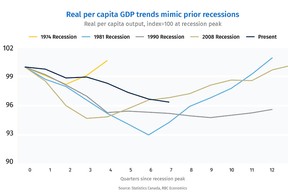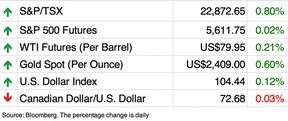Debt has become unmanageable for half of Canadians, polls suggest
Article content

Bank of Canada interest rate cuts may be coming too little, too late for many Canadians, two polls this week suggest.
The central bank reduced its benchmark interest rate to 4.75 per cent in June and another 25 basis point cut is expected tomorrow. But according to two separate surveys, many Canadians believe interest rate cuts won’t go far enough to relieve their financial strain.
Advertisement 2
Article content
“Even with a reduction in interest rates, we seem to have reached a point where debt has become unmanageable for over half of the population,” said Nancy Snedden, president of BDO Debt Solutions.
The survey done by BDO and CPA Canada found 52 per cent of Canadians don’t expect future rate cuts to provide relief, while another poll by insolvency trustee MNP Ltd. got a slightly higher result at 56 per cent.
The polls may reflect the uncertainty out there over how much interest rate relief actually is on the horizon. Some economists think the Bank of Canada will reduce its rate by one percentage point to 4 per cent by the end of the year and then gradually cut to 2.75 per cent by the end of 2025.
But the central bank has signalled that the end rate will be higher than the low interest rates seen over past decades.
The surveys suggest that those two years of aggressive rate hikes and high inflation have taken a toll.
“These results suggest lasting damage to consumer finances from years of inflation alongside rate hikes,” said David-Alexandre Brassard, chief economist at CPA Canada. “There will be ongoing consequences for the economy, even as the Bank of Canada lowers interest rates.”
Article content
Advertisement 3
Article content
The quarterly MNP Consumer Debt Index out this week dropped six points to 85, signalling that Canadians are more pessimistic about their debt.
Nearly two-thirds of Canadians in the MNP poll said high interest rates have had a negative impact on their household finances and a third said they are so heavily in debt that even lower interest rates will offer little help.
Almost half are $200 or less away from failing to meet their financial obligations, the MNP poll found. A third say they already can’t cover their bills, and of these respondents, 62 per cent say they are either insolvent or on the brink of insolvency.
“Some individuals, living paycheque to paycheque, are struggling to make ends meet and cover basic necessities. Others are so deeply indebted that their financial problems won’t be manageable regardless of interest rates,” says MNP president Grant Bazian.
Sign up here to get Posthaste delivered straight to your inbox.


What looks like a recession, feels like a recession, but technically isn’t one.
According to economists, it’s where Canada is right now, as historic population gains mask the weakness of the economy.
Advertisement 4
Article content
Overall gross domestic product has continued to grow, boosted by the 2.1 million more consumers who have arrived on the scene since mid-2022. But when you measure economic growth per person, it has declined in six of the past seven quarters.
“Without higher population boosting demand, the Canadian economy almost certainly would have contracted outright over the last two years,” said Royal Bank of Canada economists Nathan Janzen and Carrie Freestone.

- LCBO stores reopen across Ontario after two-week strike
- Today’s Data: United States existing home sales for June
- Earnings: Tesla Inc., Alphabet Inc., Canadian National Railway Co., First Quantum Minerals Ltd., General Motors Co, Coca-Cola Co., General Electric Co., Capital One Financial Corp., Visa Inc., United Parcel Service Inc.



Recommended from Editorial
-

Canadians’ migration to the Maritimes is losing steam
-

The ‘great horizontal wealth transfer’ is coming
Advertisement 5
Article content

Many of the dot-coms at the turn of the century had no earnings and no real business model, so it was no surprise when their bubble burst. Even though today’s artificial-intelligence boom is backed by solid revenues and profits, economist David Rosenberg says the current wave of AI optimism looks a lot like what we experienced back then. Read his column.
Are you worried about having enough for retirement? Do you need to adjust your portfolio? Are you wondering how to make ends meet? Drop us a line with your contact info and the gist of your problem and we’ll try to find some experts to help you out, while writing a Family Finance story about it (we’ll keep your name out of it, of course). If you have a simpler question, the crack team at FP Answers, led by Julie Cazzin, can give it a shot.
McLister on mortgages
Want to learn more about mortgages? Mortgage strategist Robert McLister’s Financial Post column can help navigate the complex sector, from the latest trends to financing opportunities you won’t want to miss. Plus check his mortgage rate page for Canada’s lowest national mortgage rates, updated daily.
Today’s Posthaste was written by Pamela Heaven, with additional reporting from Financial Post staff, The Canadian Press and Bloomberg.
Have a story idea, pitch, embargoed report, or a suggestion for this newsletter? Email us at posthaste@postmedia.com.
Bookmark our website and support our journalism: Don’t miss the business news you need to know — add financialpost.com to your bookmarks and sign up for our newsletters here.
Article content
Bank of Canada interest rate cuts too little, too late for many
2024-07-23 11:59:09





